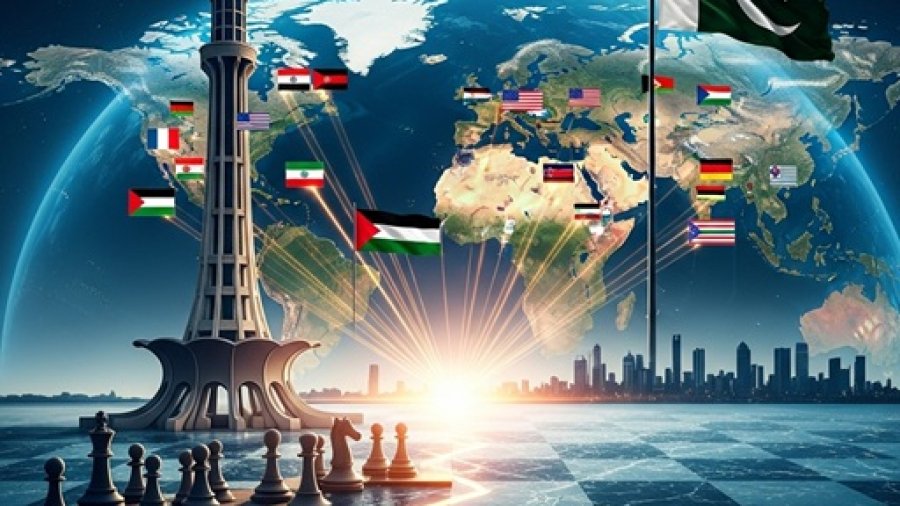Engr. Saboo Memon
In this era of global flux and geopolitical rebalancing, Pakistan holds a pivotal position at the crossroads of emerging global powers and competing civilizational ideologies. Nestled between South Asia, Central Asia, and the Middle East, and strategically bordering China, Iran, Afghanistan, and India, Pakistan’s geopolitical location has long defined its strategic relevance. Today, amid shifting alliances, exposed conspiracies, and collapsing old orders, Pakistan has a renewed opportunity to craft a sovereign and forward-looking strategy based on regional cooperation, global diplomacy, and internal consolidation.
Pakistan’s geography has historically made it a transit hub and a regional power broker. It serves as China’s gateway to the Arabian Sea via the China-Pakistan Economic Corridor (CPEC), while also being Iran’s eastern neighbor and a key player in Afghanistan’s peace and stability. With the recent Iran-Israel conflict shaking the Middle East, Pakistan has quietly expanded diplomatic space with Tehran, rooted in mutual concerns over regional peace and resistance against hegemonic powers. Unlike many other nations that took polarized positions, Pakistan’s principled neutrality and emphasis on Muslim solidarity have strengthened its image in the Islamic world.
Despite being a medium-sized power, Pakistan maintains balanced diplomatic relations with global giants. Its “mutual respect” policy with China remains a cornerstone, while its calibrated engagement with the United States, despite Washington’s internal turmoil, reflects diplomatic maturity. Pakistan’s outreach to Russia in recent years, through defense dialogues and energy discussions, further demonstrates a multi-vector foreign policy. This pragmatic approach, guided by realism and national interest, enables Pakistan to engage all sides without becoming a pawn in global rivalries.
The convergence of Indian and Israeli intelligence interests, manifest in the RAW-Mossad nexus, has emerged as a growing threat to regional stability. Both agencies appear driven by expansionist fantasies: India with the myth of Akhand Bharat, and Israel with the pursuit of a Greater Israel. Their covert operations, disinformation campaigns, and cyber offensives have been aimed at destabilizing Pakistan and undermining resistance in Muslim states. Pakistan’s intelligence and diplomatic apparatuses have increasingly begun to counter these narratives at international forums, exposing how both India and Israel threaten peace through state-sponsored terrorism and ideological extremism.
The Kashmir conflict remains the longest unresolved territorial dispute on the UN agenda. Since the revocation of Article 370 in August 2019 by India, the region has seen intensified militarization, curfews, mass detentions, internet shutdowns, and human rights violations (Human Rights Watch, 2022). Pakistan continues to advocate for the Kashmiri right to self-determination based on UNSC Resolutions 47, 91, and 122.
The Modi government’s Hindu nationalist policies have worsened the plight of Kashmiris, drawing global concern. Yet the silence of Western powers reveals geopolitical bias, often subordinating human rights to economic or strategic interests with India. Pakistan has consistently raised Kashmir at UNGA, OIC, and SCO forums, seeking peaceful resolution but maintaining its moral and political stance in solidarity with the Kashmiri people.
While India continues its quest for regional dominance, its actual influence in global multilateral institutions is waning. In the Shanghai Cooperation Organization (SCO), India often finds itself isolated on issues like terrorism and regional connectivity. In BRICS, its rivalry with China prevents any coherent strategic alignment. Meanwhile, its absence from the G7 and failure to represent the Global South effectively exposes its inflated image. Increasing authoritarianism, anti-minority violence, and economic disparities in India further diminish its credibility as a global partner.
The West, especially the United States, is experiencing internal fractures that reflect a broader decline in global hegemony. From culture wars and polarized politics to the controversial selection of key figures such as the Mayor of New York, a process now tainted by elite manipulation and financial lobbying, the American political system is under duress. NATO, once the backbone of Western military strategy, appears fatigued and increasingly irrelevant in handling crises outside Europe. Its disunity over Ukraine, failure in Afghanistan, and inability to respond to the Iran-Israel crisis all point toward strategic exhaustion.
In light of these developments, Pakistan must now transition from reactive to proactive policymaking. A few guiding principles should define its future trajectory:
1. Zero Tolerance for Anti-State Elements:
Internal cohesion is non-negotiable. Pakistan must decisively clamp down on subversive elements, whether externally supported or domestically bred. No compromise should be made on national sovereignty, especially in border regions and digital spaces.
2. Economic Revival Through Structural Reforms:
Pakistan’s true strength will stem from a robust and inclusive economy. Investment in industry, energy, agriculture, and digital infrastructure should be the top priority, alongside eliminating corruption and reforming taxation and fiscal policy.
3. Rule of Law and People’s Welfare:
Governance should be anchored in justice, transparency, and service delivery. Education, healthcare, clean water, and security must be guaranteed to every citizen, laying the foundation for a resilient and unified society.
4. Balanced Diplomacy with Assertive Sovereignty:
While maintaining peaceful ties with all nations, Pakistan must not be hesitant to call out injustices, be it Kashmir, Palestine, or disinformation wars. Multilateral platforms should be used to amplify Pakistan’s voice for justice, sovereignty, and equitable world order.
As old powers decline, new threats emerge, and regional dynamics shift, the Pakistan must recognize its pivotal role and act accordingly. With strategic foresight, national unity, and principled diplomacy, Pakistan can emerge not only as a stabilizing force in South and West Asia but also as a model of resilience in an increasingly unstable world. The choices made today will determine whether Pakistan remains a battleground for others or rises as an independent architect of its own destiny.


